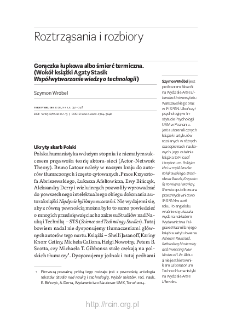
Object
Title: Gorączka łupkowa albo śmierć termiczna. (Wokół książki Agaty Stasik "Współwytwarzanie wiedzy o technologii")
Subtitle:
Publisher:
Place of publishing:
Description:
21 cm ; Pol. text, eng. summary
References:
1. Afeltowicz Łukasz, Sojak Radosław, Arystokraci i rzemieślnicy. Synergia stylów badawczych, Toruń: Wydawnictwo Naukowe Uniwersytetu Mikołaja Kopernika 2015.
2. Beck Ulrich, Społeczeństwo ryzyka. W drodze do innej nowoczesności, przeł. S. Cieśla, Warszawa:. Scholar 2002.
3. Bińczyk Ewa, Derra Aleksandra (red.), Studia nad nauką i technologią. Wybór tekstów, Toruń: Wydawnictwo Naukowe Uniwersytetu Mikołaja Kopernika 2014.
4. Callon Michel, Lascoumes Pierre, Barthe Yannick, Burchell Graham, Acting in an Uncertain World: An Essay on Technical Democracy, Inside Technology, The MIT Press, 2009.
5. Cetina Karin Knorr, Epistemic Cultures: How the Sciences Make Knowledge, Cambridge MA-London 1999.
6. Feenberg Andrew, Callon Michel, Between Reason and Experience: Essays in Technology and Modernity, The MIT Press, 2010.
![]()
7. Irwin Alan, Brian Wynne, Misunderstanding Science?: The Public Reconstruction of Science and Technology, Cambridge University Press, 1996.
![]()
8. Jasanoff Sheila, Designs on Nature: Science and Democracy in Europe and the United States, Princeton University Press, 2005.
![]()
9. Latour Bruno, Facing Gaia: Eight Lectures on the New Climatic Regime, Cambridge, UK; Malden, MA: Polity, 2017.
10. Latour Bruno, Splatając na nowo to, co społeczne. Wprowadzenie do teorii aktora-sieci, przeł. K. Abriszewski, A. Derra, Kraków 2010.
11. Mitchell Timothy, Carbon Democracy: Political Power in the Age of Oil, London and New York: Verso Books, 2011.
12. Nowotny Helga, Scott Peter B., Gibbons Michael T., Re-Thinking Science: Knowledge and the Public in an Age of Uncertainty, Polity, 2001,
13. O'Neil Cathy, Broń matematycznej zagłady. Jak algorytmy zwiększają nierówności i zagrażają demokracji, przeł. M. Zieliński, Warszawa: Wydawnictwo Naukowe PWN 2017.
14. Stasik Agata, Współwytwarzanie wiedzy o technologii, Toruń: Wydawnictwo Naukowe Uniwersytetu M. Kopernika, Monografie FNP 2019.
15. Szołucha Anna (ed), Energy, Resource Extraction and Society: Impacts and Contested Futures, Routledge Studies of the Extractive Industries and Sustainable Development 2018.
![]()
16. Wallace-Wells David, The Uninhabitable Earth: Life after Warming, New York: Tim Duggan Books 2019.
17. Zaród Marcin, Hakerzy i kolektywy hakerskie w Polsce. Od operacjonalizacji do laboratoriów i stref wymiany, Studia Socjologiczne, 2017, 1 (224,) s. 225-252.
Relation:
Issue:
Start page:
End page:
Detailed Resource Type:
Resource Identifier:
oai:rcin.org.pl:204098 ; 0867-0633 ; 10.18318/td.2020.1.13
Source:
IBL PAN, call no. P.I.2524 ; click here to follow the link
Language:
Language of abstract:
Rights:
Creative Commons Attribution BY 4.0 license
Terms of use:
Copyright-protected material. [CC BY 4.0] May be used within the scope specified in Creative Commons Attribution BY 4.0 license, full text available at: ; -
Digitizing institution:
Institute of Literary Research of the Polish Academy of Sciences
Original in:
Library of the Institute of Literary Research PAS
Projects co-financed by:
European Union. European Regional Development Fund ; Operational Program Digital Poland, 2014-2020, Measure 2.3: Digital accessibility and usefulness of public sector information; funds from the European Regional Development Fund and national co-financing from the state budget.
Access:
Object collections:
Last modified:
Oct 4, 2023
In our library since:
Jul 29, 2021
Number of object content downloads / hits:
482
All available object's versions:
https://rcin.org.pl/ibl/publication/239314
Show description in RDF format:
Show description in RDFa format:
Show description in OAI-PMH format:
Objects Similar
Nünning, A
Szydłowski, Konstanty
Szczęsna, Ewa
Popławska, Magdalena Sikorska, Karolina
Litwinowicz-Droździel, Małgorzata

 INSTYTUT ARCHEOLOGII I ETNOLOGII POLSKIEJ AKADEMII NAUK
INSTYTUT ARCHEOLOGII I ETNOLOGII POLSKIEJ AKADEMII NAUK
 INSTYTUT BADAŃ LITERACKICH POLSKIEJ AKADEMII NAUK
INSTYTUT BADAŃ LITERACKICH POLSKIEJ AKADEMII NAUK
 INSTYTUT BADAWCZY LEŚNICTWA
INSTYTUT BADAWCZY LEŚNICTWA
 INSTYTUT BIOLOGII DOŚWIADCZALNEJ IM. MARCELEGO NENCKIEGO POLSKIEJ AKADEMII NAUK
INSTYTUT BIOLOGII DOŚWIADCZALNEJ IM. MARCELEGO NENCKIEGO POLSKIEJ AKADEMII NAUK
 INSTYTUT BIOLOGII SSAKÓW POLSKIEJ AKADEMII NAUK
INSTYTUT BIOLOGII SSAKÓW POLSKIEJ AKADEMII NAUK
 INSTYTUT CHEMII FIZYCZNEJ PAN
INSTYTUT CHEMII FIZYCZNEJ PAN
 INSTYTUT CHEMII ORGANICZNEJ PAN
INSTYTUT CHEMII ORGANICZNEJ PAN
 INSTYTUT FILOZOFII I SOCJOLOGII PAN
INSTYTUT FILOZOFII I SOCJOLOGII PAN
 INSTYTUT GEOGRAFII I PRZESTRZENNEGO ZAGOSPODAROWANIA PAN
INSTYTUT GEOGRAFII I PRZESTRZENNEGO ZAGOSPODAROWANIA PAN
 INSTYTUT HISTORII im. TADEUSZA MANTEUFFLA POLSKIEJ AKADEMII NAUK
INSTYTUT HISTORII im. TADEUSZA MANTEUFFLA POLSKIEJ AKADEMII NAUK
 INSTYTUT JĘZYKA POLSKIEGO POLSKIEJ AKADEMII NAUK
INSTYTUT JĘZYKA POLSKIEGO POLSKIEJ AKADEMII NAUK
 INSTYTUT MATEMATYCZNY PAN
INSTYTUT MATEMATYCZNY PAN
 INSTYTUT MEDYCYNY DOŚWIADCZALNEJ I KLINICZNEJ IM.MIROSŁAWA MOSSAKOWSKIEGO POLSKIEJ AKADEMII NAUK
INSTYTUT MEDYCYNY DOŚWIADCZALNEJ I KLINICZNEJ IM.MIROSŁAWA MOSSAKOWSKIEGO POLSKIEJ AKADEMII NAUK
 INSTYTUT PODSTAWOWYCH PROBLEMÓW TECHNIKI PAN
INSTYTUT PODSTAWOWYCH PROBLEMÓW TECHNIKI PAN
 INSTYTUT SLAWISTYKI PAN
INSTYTUT SLAWISTYKI PAN
 SIEĆ BADAWCZA ŁUKASIEWICZ - INSTYTUT TECHNOLOGII MATERIAŁÓW ELEKTRONICZNYCH
SIEĆ BADAWCZA ŁUKASIEWICZ - INSTYTUT TECHNOLOGII MATERIAŁÓW ELEKTRONICZNYCH
 MUZEUM I INSTYTUT ZOOLOGII POLSKIEJ AKADEMII NAUK
MUZEUM I INSTYTUT ZOOLOGII POLSKIEJ AKADEMII NAUK
 INSTYTUT BADAŃ SYSTEMOWYCH PAN
INSTYTUT BADAŃ SYSTEMOWYCH PAN
 INSTYTUT BOTANIKI IM. WŁADYSŁAWA SZAFERA POLSKIEJ AKADEMII NAUK
INSTYTUT BOTANIKI IM. WŁADYSŁAWA SZAFERA POLSKIEJ AKADEMII NAUK
































